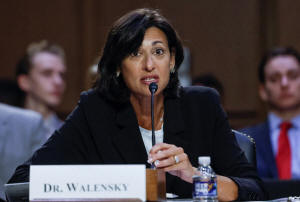US CDC chief Rochelle Walensky stepping down in June
 Send a link to a friend
Send a link to a friend
 [May 06, 2023]
By Ahmed Aboulenein and Julie Steenhuysen [May 06, 2023]
By Ahmed Aboulenein and Julie Steenhuysen
WASHINGTON (Reuters) -U.S. Centers for Disease Control and Prevention
(CDC) Director Dr. Rochelle Walensky, a top health official who oversaw
the agency's contentious response to the COVID-19 pandemic, is leaving
the institution at the end of June, the CDC said on Friday.
Walensky led the institution for two years while the pandemic was at its
height. Her agency was pivotal in ushering in the adoption of vaccine
recommendations that slowed the spread of a virus that has killed more
than a million Americans and is still killing more than a thousand a
week.
She, alongside the government's former top infectious disease expert Dr.
Anthony Fauci, was the face of the Biden administration's pandemic
response and often found herself at the heart of difficult grilling by
Republicans in Congress as well as public criticism.
"The end of the COVID-19 public health emergency marks a tremendous
transition for our country, for public health, and in my tenure as CDC
Director," Walensky wrote to President Joe Biden in her resignation
letter.
The government will on May 11 end the COVID-19 public health emergency
that allowed millions of Americans to receive vaccines, tests and
treatments at no cost during the pandemic.

"In the process, we saved and improved lives and protected the country
and the world from the greatest infectious disease threat we have seen
in over 100 years," she wrote.
Biden thanked Walensky for her work, saying she had saved lives by
marshalling scientists and public health experts to turn the tide
against the pandemic.
"We have all benefited from her service and dedication to public health,
and I wish her the best in her next chapter," Biden said in a statement.
In response to criticism of the CDC's pandemic response, including late
and confusing public health guidance, Walensky oversaw a revamp of the
agency's structure to enable a nimble response to future pandemics.
"For 75 years, CDC and public health have been preparing for COVID-19,
and in our big moment, our performance did not reliably meet
expectations," she told CDC staff last summer.
Walensky did not immediately respond to a request for comment.

[to top of second column]
|

Dr. Rochelle Walensky, U.S. Centers for
Disease Control and Prevention Director, testifies during a Senate
Health, Education, Labor, and Pensions Committee hearing on the
monkeypox outbreak, in Capitol Hill in Washington, U.S., September
14, 2022.
 DIFFICULT TENURE
Her proposed plans to modernize the agency included giving the CDC
new authority to require states to report data as well as changes
that would allow the CDC to hire staff more quickly and offer more
competitive salaries.
Both actions would require authorization from Congress.
Public health experts said Walensky wrestled with political and
technical challenges during her tenure.
"She faced just extraordinary challenges," said Dr. William
Schaffner, an infectious disease expert and longtime consultant to
the CDC's Advisory Committee on Immunization Practices, which
advises the agency on vaccine policies.
Schaffner said Walensky faced the largest pandemic since the 1917 to
1918 global influenza pandemic, and outdated practices of gathering
necessary data hamstrung her from the start.
Political interference by the previous Trump administration also
impeded her tenure, he said. "There wasn't any doubt that she had to
work to restore the CDC's reputation."
These issues interfered with her ability to effectively lead the
agency, said Dr. Amesh Adalja, a senior scholar at the Johns Hopkins
Center for Health Security.
"Dr. Walensky was put into place at the CDC at a time when the
agency was basically captive to politicians which clearly hampered
her ability to lead," he said.

Dr. Celine Gounder, an infectious disease epidemiologist and an
editor-at-large at Kaiser Health News, said the timing of the
announcement surprised her.
"She had taken important steps to reform the agency. Her work wasn't
done," said Grounder.
(Reporting by Ahmed Aboulenein in Washington and Julie Steenhuysen
in Chicago; Additional reporting by Ismail Shakil in Ottawa; Editing
by Tim Ahmann, Emelia Sithole-Matarise and Josie Kao)
[© 2023 Thomson Reuters. All rights
reserved.]This material may not be published,
broadcast, rewritten or redistributed.
Thompson Reuters is solely responsible for this content. |